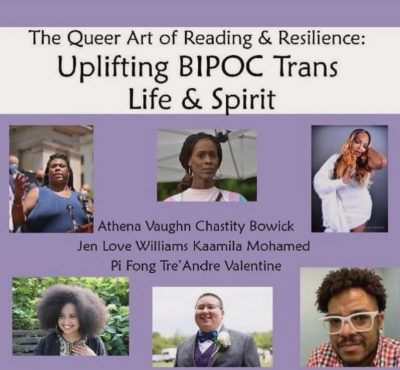LGBTQ individuals experience higher rates of violence and death than their heterosexual peers, and this reality can take a toll.

To celebrate trans resilience and address topics such as transphobia and assault, Boston University’s School of Theology hosted a webinar Oct. 29 featuring six trans activists of color. Panelists discussed spirituality, queer community and the strength they exhibit moving through life as trans POC.
Transgender POCs often face an uphill battle in life, panelist Jennifer Love Williams, a Black trans woman and activist, said during the event.
“Being Black and being trans,” Love said, “you’re put at the bottom of the totem pole.”
STH graduate student Jeremy Schulz was the main organizer of the webinar, entitled “The Queer Art of Reading and Resilience: Uplifting BIPOC Trans Life and Spirit.” Schulz said the event received pushback from STH administration regarding its theme. The librarians, he said, were “pressured to withdraw their support.”
The topic shifted away from an analysis of queer “reading,” a slang term meaning to poke fun as a means of strength and creativity, toward a celebration of spirituality and resilience, Schulz said.
Schulz said in an interview LGBTQ students in STH see symbolic support from the school, but that there is still work to be done to further this level of acceptance and support.
“It’s easy to see progress and then just stop there. We saw that with same-sex marriage,” Schulz said. “Lots of funding stopped, lots of people who were advocating and marching and doing things started to live their lives more.”
Panelists consisted solely of trans POC, with the goal of highlighting and uplifting the voices that are most marginalized in American society.
Love, who is also the founder of Jen Love Project — which aims to support incarcerated LGBTQ individuals after their release — said during the panel Black transgender people often exist only in the shadows, and aren’t recognized enough for their contributions to society.
“We’re never given our credit,” Love said. “You call us to the table to sit here and get the grants, get the acknowledgement, but then you hand us this piece of the pie, and you send us on our way.”
Athena Vaughn, an activist who has worked with Trans Resistance and Fenway Health, said during the panel the trans community, especially POC, tends to support other queer issues while getting the “short end of the stick” in return.
“2020 is that year that sparked trans people’s uprising to find the resilience in ourselves,” Vaughn said, “to find the strength in who we are as trans individuals of color, to be able to fight back and speak up and have them understand that we’re no longer going to take this.”
In conversations about the meanings of “strength” and “resilience,” Love shared stories of the xenophobia and violence she experienced while incarcerated, and said she felt hopeless after being assaulted multiple times.
“I’m a fighter, and I became more of a fighter the more I came out and started becoming her,” Love said, “but at this moment in time, I felt helpless and I had nothing.”
Through that experience, Love became an advocate working with various organizations pushing to enact change for women who are incarcerated, LGBTQ or affected by HIV.
Meanwhile, Vaughn said that growing up in a Baptist church, she encountered homophobic and transphobic clergy as well as family members, but ultimately knew their prejudice was not compatible with their religion.
“Spirituality for me, growing up, was a big, big thing, and I had to learn and teach myself how to get to know Christ for myself,” Vaughn said. “Stop worrying about what it is that people were saying around me, stop worrying about what people thought around me.”
Triss Ingels, a graduate student in STH who attended the webinar, said they appreciated the panelists’ diverse connections to spirituality in their lives.
“Even though I’m trans, I have a very different experience and there’s a lot of privilege that comes with being white and being well-off and being highly educated,” Ingles said. “That was the beauty of this whole event, is that we’re getting different people, we’re getting different perspectives, all BIPOC trans people.”
The panelists urged attendees to celebrate Transgender Day of Remembrance later this month, whether that be by talking about late trans individuals with friends and family or financially supporting the trans community. They can also attend a march scheduled for Nov. 22 in Jamaica Plain’s Franklin Park.
Despite the harsh realities trans people of color face, Schulz said presenting oneself fully and authentically should remain the goal.
“[Queer resilience is] just being able to laugh and live and love while you’re being crucified,” Schulz said, “being able to love, still, and have love for yourself and for others and to not let them get you down.”























































































































